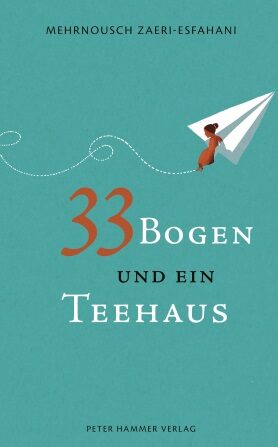Mehrnousch Zaeri-EsfahaniMehrdad Zaeri-Esfahani
33 Bogen und ein Teehaus
[33 Arches and a Teahouse]
- Peter Hammer Verlag
- Wuppertal 2016
- ISBN 978-3-7795-0522-8
- 148 Pages
- 11 Suitable for age 12 and above
- Publisher’s contact details
Mehrnousch Zaeri-Esfahani
33 Bogen und ein Teehaus
[33 Arches and a Teahouse]
Sample translations
A Million Butterflies in My Head
Already on the first page of her book, Mehrnouch Zaeri-Esfahani proves that she is a virtuoso storyteller. Didn’t we know all the details about Chernobyl? She portrays the events as if we were seeing them for the very first time, or as if they took place in the distant past. The Iranian author, born in Isfahan in 1974, describes an "unheard-of event," following the tradition of the German novella. Describing reality and making it sound like fiction lightens the load of the factual, it gives it a playful note and makes it negotiable. The deserted town of Pripyat has seemingly nothing to do with the fate of an Iranian family. But the other is a mirror of oneself, and the grand catastrophe is echoed by a smaller, private one. This twist makes the narrative even more interesting, especially considering the author’s choice of tone, combining friendliness with childlike earnestness.
We see the father, a well-to-do doctor, protesting the Shah regime on the streets, and his children experiencing the revolution as a big adventure. The compulsory headscarf is used to portray the reign of terror imposed by the new religious system. A dimension of murderous cynicism is revealed in the congratulatory postcards sent by the state to the mothers of fallen soldiers in the Iran-Iraq War. The family flees at night to Turkey, leaving behind their beloved cats. Their odyssey takes them to East and West Berlin, then via Karlsruhe to Heidelberg.
The feeling of belonging nowhere, of being wanted nowhere, the exhaustion, the poverty, the humiliations faced by a child in school who doesn’t know the language – we read all of this with bated breath, because Mehrnousch Zaeri-Esfahani tells her story without a trace of sentimentality. The hardships of a child that is laughed at and whose soul has been cut to the quick with shame, wounds so deep they never entirely heal – scenes like this remain indelibly impressed on our minds after reading them. Of course there are people who notice things, like the teacher who recognizes the child’s talent. The book is by no means bitter and pessimistic.
Rather, we see the world with the wide-open eyes of a child whose curiosity is insatiable, whether in the harbor of Istanbul or the toy department of KaDeWe. Zaeri-Esfahani has an eye for others, which lends her report suspense and credibility. No recent German young-adult book has such a densely woven narrative fabric, and none gives such an immediate impression of what it means to have a home.
Translated by David Burnett

By Thomas Linden
Thomas Linden is a journalist (Kölnische Rundschau, WWW.CHOICES.DE) specializing in the areas of literature, theater and film. He also curates exhibitions on photography and picture book illustration.
Publisher's Summary
Little Mehrnousch, daughter of a surgeon, shares a privileged childhood with her three siblings in the beautiful city of Isfahan, in 1970s Iran. Her family, like most, celebrates the ousting of the Shah as a joyful event, hardly suspecting that the new ruler, Ayatollah Khomeini, would soon become a despot, depriving them of every freedom. Mehrnousch is scared and angry as she watches the oppression spread to virtually every area of life. When her fourteen-year-old brother Mehrdad is in danger of being sent to war, the family flees to West Germany, via Istanbul and East Berlin. This marks the start of an odyssey through countless refugee homes with ups and downs between hope and despair, until finally the family finds a new home in Heidelberg. Powerfully poetic, Mehrnousch Zaeri-Esfahani tells the story of her childhood from the time she was five to the age of eleven. She recounts the beauty of her hometown, Isfahan, and the happy life her family led there, the agonies of dictatorship, and the sad but sometimes cheerful moments she experienced during these years. She describes the states of speechlessness and homelessness, as well as the joy of arrival.
(Text: Peter Hammer Verlag)
